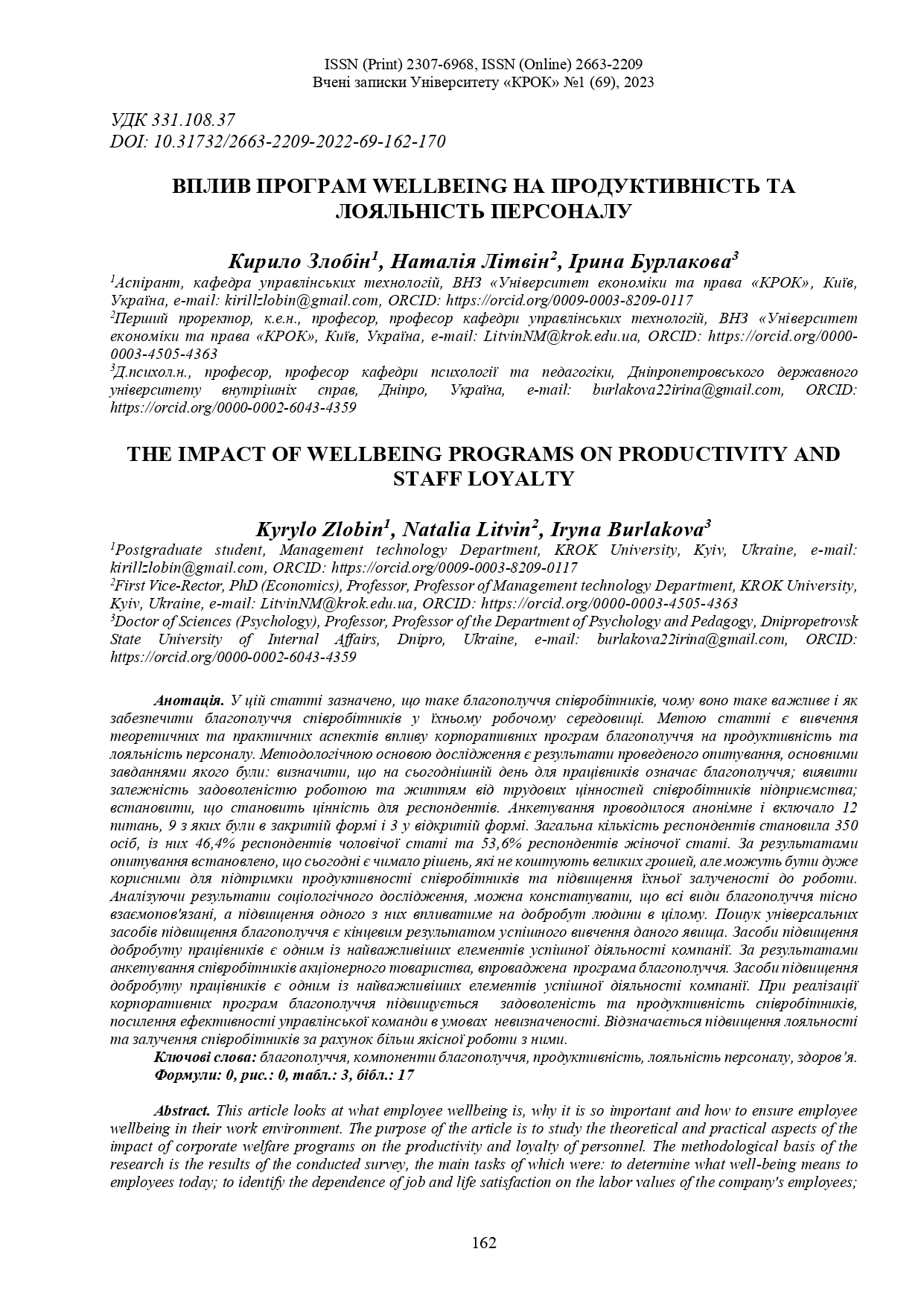THE IMPACT OF WELLBEING PROGRAMS ON PRODUCTIVITY AND STAFF LOYALTY
DOI:
https://doi.org/10.31732/2663-2209-2022-69-162-170Keywords:
well-being, components of well-being, productivity, staff loyalty, healthAbstract
This article looks at what employee wellbeing is, why it is so important and how to ensure employee wellbeing in their work environment. The purpose of the article is to study the theoretical and practical aspects of the impact of corporate welfare programs on the productivity and loyalty of personnel. The methodological basis of the research is the results of the conducted survey, the main tasks of which were: to determine what well-being means to employees today; to identify the dependence of job and life satisfaction on the labor values of the company's employees; establish what constitutes value to respondents. The questionnaire was conducted anonymously and included 12 questions, 9 of which were in a closed form and 3 in an open form. The total number of respondents was 350, of which 46.4% were male and 53.6% were female. According to the results of the survey, there are many solutions today that do not cost a lot of money, but can be very useful in maintaining employee productivity and increasing their engagement at work. Analyzing the results of sociological research, it can be stated that all types of well-being are closely interrelated, and the improvement of one of them will affect the well-being of a person as a whole. The search for universal means of increasing well-being is the final result of the successful study of this phenomenon. Means of improving the well-being of employees is one of the most important elements of the company's successful operation. According to the results of the survey of employees of the joint-stock company, a well-being program was implemented. Means of improving the well-being of employees is one of the most important elements of the company's successful operation. The implementation of corporate welfare programs increases the satisfaction and productivity of employees, and increases the effectiveness of the management team in conditions of uncertainty. An increase in employee loyalty and engagement due to better quality work with them is noted.
Downloads
References
Бурлакова І. А. Корпоративні практики підтримки професійного здоров’я персоналу: соціально-психологічний підхід / І. А. Бурлакова // Актуальні проблеми психології: зб. наук. пр. Інституту психології імені Г. С. Костюка НАПН України. – К. ; Ніжин: ПП Лисенко, 2016. – Т. ІХ, Вип. 8 – С. 502 – 511.
Мігус, І. П., & Черненко, С. А. (2013). Оцінка лояльності персоналу в контексті забезпечення економічної безпеки підприємства. Агросвіт, (11), 24-27.
Beaumont Jen Measuring National Well-being – Older people and loneliness [Electronic resource] // The Office for National Statistics. Electronic data. Newport, 2013. URL: http://www.ons.gov.uk/ons/dcp171766_304939.pdf
Burlakova, O. Sheviakov, T. Kondes Coaching as a tool for the formation of corporate well-being Scientific Center of Innovative Researches. P.306. https://conf.scnchub.com/index.php/ICEAF-2021/paper/viev/
Burlakova, O. Sheviakov, T. Kondes Сognitive approach to corporate well-being management International conference on economics, accounting and finance academy of economics and pedagogy July 2, 2020 – July 4, 2020 at the Prague, Czech Republic, 2020. – P. 29 – 30.
Burlakova, O. Sheviakov, T. Kondes Features of corporate well-being.-Corporate management: from creation to success: monograph. Tallinn. Scientific Center of Innovative Researches OÜ. 2020. – 352 р. – P. 142 – 154. DOI: https://doi.org/10.36690/CMCS-142.
Capnary, M.C., Rachmawati, R., Agung, I. 2018. The influence of flexibility of work to loyalty and employee satisfaction mediated by work life balance to employees with millennial generation background in Indonesia startup companies. Business: Theory and Practice, 19, 217-227.
Culbertson, S. (2010). Feeling good and doing great: The relationship between psychological capital and well-being. Journal of Occupational Health Psychology. Vol.15. № 4, pp. 421 – 433.
Enhancing well-being at work: The role of emotion regulation skills as personal resources / G. Buruck, D. Dorfel, J. Kugler, S. Brom // Journal of Occupational Health Psychology. – 2016. – Vol. 21 (4). – P. 480-493.
Gorgenyi-Hegyes E, Nathan RJ, Fekete-Farkas M. Workplace Health Promotion, Employee Wellbeing and Loyalty during Covid-19 Pandemic—Large Scale Empirical Evidence from Hungary. Economies. 2021; 9(2):55. https://doi.org/10.3390/economies9020055
Harter, J.K., Schmidt, F.L. and Keyes, C.L. (2003) Well-Being in the Workplace and Its Relationship to Business Outcomes: A Review of the Gallup Studies. In: Keyes, C.L.M. and Haidt, J., Eds., Flourishing: Positive Psychology and the Life Well-Lived, American Psychological Association, Washington DC, 205-224. http://dx.doi.org/10.1037/10594-009
Mazur-Wierzbicka E. Determinants of Employee Loyalty from the Perspective of Employees of Socially Responsible Organizations European Research Studies Journal Volume XXIV, Issue 4B, 202 pp. 713-722.
Mihus, I., Laptev, S., Parashchenko, L., Koval, Y., Odarchyk, K., & Panchenko, O. (2021). The impact of the covid-19 pandemic on the loyalty of employees. Ad Alta-Journal of Interdisciplinary Research, 38-41.
Mininni, G., Manuti, A., Scardigno, R., & Rubino, R. (2010). Subjective wellbeing between organizational bonds and cultural contaminations. World Futures: The Journal of Global Education. 66(6), 387–397.
Moen, P., E. L. Kelly, W. Fan, S.-R. Lee, D. Almeida, E. E. Kossek, and O. Buxto, Does a Flexibility/Support Organizational Initiative Improve High-Tech Employees’ Wellbeing? Evidence from the Work, Family, and Health Network, American Sociological Review, 81(1), 134-164, 2016.
Oswald, A. J., E. Proto, and D. Sgroi, Happiness and Productivity, Journal of Labor Economics, 33(4), 789-822, 2015.
2020 SOCIAL PROGRESS INDEX. URL: http://surl.li/gbuyw.

Downloads
Published
How to Cite
Issue
Section
License

This work is licensed under a Creative Commons Attribution-NonCommercial 4.0 International License.

